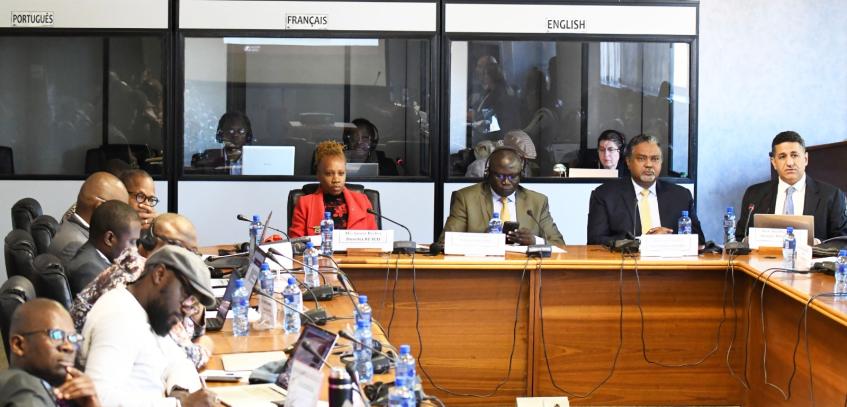Convened by the Pan-African Parliament (PAP), a meeting on Enhancing Access to African Legal Information has laid the foundation for a unified and cohesive approach to knowledge management and the implementation of open data principles, ensuring harmonized practices and maximizing its benefits across the African Union (AU).
The workshop reached a consensus on close collaboration and adoption of an inclusive approach, among all relevant organs, departments, directorates, offices, and units, to develop a comprehensive strategy for open data implementation to foster transparency and accessibility whilst aligned to the values and objectives of the AU.
In this regard, an action team led by the Pan-African Parliament and the Information and Communication Directorate (ICD) of the AU will be established to develop a road map for the implementation of standards, and institutional and legal framework and strategy for the continental body. Organized from 14 to 15 June 2023, at the Seat of the Pan-African Parliament in Midrand, South Africa, the workshop sought to explore the potential benefits of open data and a common way forward for the publication of information.
Defining open data as data that is freely available for anyone to access, use, and share without restrictions and is an essential aspect of digital transformation, the Pan-African Parliament-led meeting noted that the implementation of open data principles and the creation of open data portals can assist AU institutions in making information publicly and easily available; promoting transparency and accountability; enabling citizens to participate in decision-making processes; and enhancing the impact of the AU especially about the implementation of Agenda 2063 and key legal instruments.
The two-day workshop gathered representatives from AU organs and Institutions such as the Pan-African Parliament(PAP); African Commission on Human and Peoples’ Rights(ACHPR); African Court on Human and Peoples’ Rights (AfCHPR); African Committee of Experts on the Rights and Welfare of the Child(ACERWC); Economic, Social and Cultural Council (ECOSOCC); Information and Communication Directorate (ICD); Office of the Deputy Chairperson (DCP); Office of the Legal Counsel(OLC); the African Governance Architecture Secretariat(AGA-APSA); and partners from the Open Data Consortium including African Law Institute (African LII) and Laws Africa.
The gathering covered in-depth presentations and discussions on various thematic issues including the importance of open data portals in promoting transparency, accountability, and public participation in AU institutions; challenges and opportunities associated with implementing open data portals in African Union institutions; best practices and experiences in implementing open data portals within AU institutions; opportunities available through inter-linking data across the AU and the need for a standard format for documents; and how the publishing of AU legal information can enhance tracking of implementation of decisions and policies of the AU institutions.
In his welcome remarks, Mr. Gali Massa Harou, Acting Clerk of the Pan-African Parliament expressed gratitude to all participants for honoring the Parliament’s invitation to explore a common way forward for the publication of legal information across AU institutions. “I extend my heartfelt appreciation to every one of you for your active participation, unwavering commitment, and passion for the betterment of our continent. As we embark on this journey, let us seize this opportunity to collaborate, share our knowledge and experiences, and chart a course that enables us to fully harness the potential of open data and access to legal information in service of Africa's progress,” said Mr. Harou.
ICD working with the Pan-African Parliament and relevant AU stakeholders will provide overall leadership and coordination throughout this process including the submission of relevant reports to the Specialised Technical Committee (STC) on Communication & ICT. Speaking during the workshop, Ms. Leslie Richer, Director for Information and Communication described the ICD’s role in coordinating the implementation of decisions on communication by the STC, using various strategies and channels.
“In addition to informing, it’s also the Directorate’s responsibility to create awareness about all AU treaties in a manner that brings the AU closer to the African citizenry. Therefore, the goal of all knowledge management systems should be to position the AU as people-centered union through better access and understanding of its mandates and key programmes,” said Ms. Richer.
The Pan-African Parliament workshop on Enhancing Access to African Legal Information was organized with the support of the African Governance Architecture Support Project (AGA-SP) to support AGA Platform Members in adopting open data principles. The AGA-SP is part of the partnership and collaboration between the African Union (AU) and the European Union (EU) aimed at strengthening the capacity of AGA Platform Members and promoting effective coordination and cooperation among them.
Ms. Lindiwe Khumalo, Technical Head of the AGA Bureau said that all stakeholders including the AGA leadership would be seized with and the report would be submitted to the leadership of the platform during the next meeting. “Our conclusions shall be shared with relevant stakeholders and the respective political leaderships, recommending the development of an integrated, open, accessible, and transparent knowledge management system for the AU,” indicated Ms. Khumalo.
The goal of the recently concluded consultation is an AU-wide knowledge and information portal that is based on open data principles, agile, flexible, inter, and cross-linked with portals of individual AU organs and institutions.
The Pan-African Parliament has already started the process of implementing an open data portal, becoming the first AU organ to initiate the process. As such, the Parliament will play a key role in bringing other organs up to speed on the importance of open data as well as technical and capacity requirements and capabilities needed for open data adoption - including mapping and categorizing the data and information.








